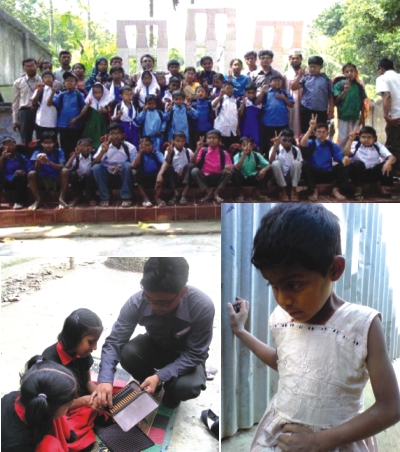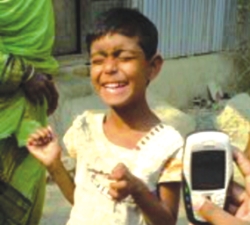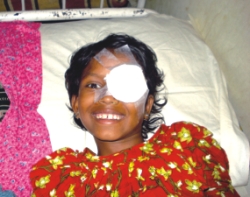|
Making a Difference
Bringing Light Into Darkness
Marzia Rahman
"I am only one, but still I am one. I can not do everything, but still I can do something. And because I can not do everything I will not refuse to do the something that I can do.” --Hellen Keller
Six-years-old Jasmine, the only child of Md. Johurul and Aleya Begum has congenital blindness. When she was born, her parents were disappointed but they accepted this beloved child with great affection.
When Child Sight Foundation (CSF) first saw Jasmine, she was a beautiful child who hardly communicated and remained gloomy all the time. The CSF started working with her to provide some help. Now Jasmine can talk well, can sing a song and even recite a poem. When asked about her aim in life she says, “I want to be able to do everything independently like other girls in the village.” She has a dream of being a good teacher in future.
Seven-year-old Shumi, daughter of Shirajgonj's rickshawpuller Kamal Ali was born with blindness. To her parents it was a curse, which should be kept hidden in the house. Since they were poor, they had also no hope of treating her. The chairman of the village advised Kamal Ali to take his daughter to a free eye camp organised by the CSF where the doctors found that it was a simple cataract problem, which could be cured. Shumi now no longer needs to stay inside the house; rather she could roam around the village and see the world with her newly gained vision.

Like Jasmine and Shumi there are hundreds of millions of children in Bangladesh who are born or become blind in their early childhood, leading a life of untold misery and utter misfortune. According to a survey conducted by the CSF, Bangladesh has around 40,000 blind children.
The CSF is the brainchild of Dr MA Muhit, who in 2000, came to Bangladesh to undertake a feasibility study for the International Centre for Eye Health in London. The purpose was to plan and implement the First National Study on Childhood Blindness in Bangladesh to inform policy makers about the number and causes of childhood blindness in the country. What he saw was horrifying enough to make him decide to start something himself. On 30th December 2002 the CSF was born.
The main aim of the organisation was to target the estimated 40,000 blind children in the country. “The CSF not only gives treatment to the blind children but also tries to ensure rehabilitation for them,” says Kamrun Nahar, the CSF's Information and Communication Officer. The CSF tries to ensure that no child in Bangladesh is blind from potentially preventable and treatable causes and all incurably blind children and their families have access to education, rehabilitation, recreation, self help and equal participation in the society and its development.
To reach the blind children, most of who live in the remotest rural areas of the country, is always a challenge. Early detection, referral and surgery are essential for good visual outcome. To find the blind children the CSF invented an innovative method called Key Informant method. After extensive field research this method has been developed and piloted. The method involves using volunteers who know their community well, whether through their occupational or social roles, in order to identify children who are blind. These volunteers, called Key Informants, can be health workers, schoolteachers, non-governmental organisation (NGO) staff, religious leaders (imams, church leaders etc.), traditional healers, or other people who are actively involved in the social network of the community. They had to undertake a short training course in their area on how to identify blindchildren. 
Since 2003, CSF has been using this method in various districts of Bangladesh to detect and refer cataract blind children for sight restoring surgery. Over one third of total blind children have already been identified by this programme. It is expected that by using the Key Informant Method, by 2010 all blind children will be identified and cataract blindness due to cataract will be eliminated. This method has been appreciated globally and in countries like India, Pakistan, Ghana and Malawi it has been successfully replicated.
The success of the Key Informant Method and CSF led to the creation of Child Disability Study in 2008 which encompasses not only blind children but also other physically disabled children. In 2008, the CSF has also established its own hospital Wahida Matin Memorial CSF Child Vision Centre with the collaboration of Wahida Matin Memorial Trust.
From the beginning, CSF has launched several projects and campaigns. These projects aim to address the need of incurably blind children. It focuses on comprehensive 'Community Based Rehabilitation (CBR)' approach in its broadest sense to include home-based Rehabilitation, Inclusive Education, Self Help Group and advocacy delivered as integrated service based at the Upazilla (sub-district) level.
 Dr M A Muhit, the founder President of the CSF, points out that the journey with CSF has taught him few essential lessons. He says, “The social capital in Bangladesh is well developed. Bangladeshi people are friendly and communicative which ensures the success of the Key Informant Method”. Dr M A Muhit, the founder President of the CSF, points out that the journey with CSF has taught him few essential lessons. He says, “The social capital in Bangladesh is well developed. Bangladeshi people are friendly and communicative which ensures the success of the Key Informant Method”.
But he says that the problems are much deeper and varied. This is not only a case of blind child but with it comes the problems of child marriage, malnutrition, lack of education, the negative attitude of the society towards disabled people, rehabilitation etc. Funding is another huge problem. Since it is a non-profit organisation, only 400 children out of 40,000 could have been rehabilitated because of lack of funds.
Child Sight Foundation started its noble journey with a vision of a world where no child is denied his or her human rights because of blindness, they dream of a society where no-one is stigmatised for her physical disability.
Since its establishment the CSF has been doing a world of good, making a profound contribution to the society by bringing light and happiness to the lives of thousands of unfortunate children and their families so that they can lead a wholesome and meaningful life.
If the reader is interested in donating or learning more about CSF consult the organisation's website- www.childsight-foundation.org or e-mail to cbpb@agni.com, Dhaka office- New DOHS, Mohakhali (RD#12, HSE#208).
Copyright (R) thedailystar.net 2008 |
